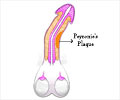A vital ingredient for the initiation of Alzheimer's plaque is produced by brain cell activity, neuroscientists at Washington University School of Medicine in St. Louis have announced.
The researchers found that the ability of brain cells to absorb substances from their surface, a process called endocytosis, is essential to producing amyloid beta, a protein fragment that clusters together to form Alzheimer's plaques.The researchers used a drug to shut down the intake process, known as endocytosis, in a mouse model of Alzheimer's disease. The change led to a 70 percent drop in levels of amyloid beta, the protein fragment that clumps together to form Alzheimer's plaques.
Importantly, they also found that endocytosis' ability to increase amyloid beta was coupled to normal nerve cell communication called synaptic activity.
"Blocking endocytosis isn't a viable option for treatment because cells throughout the body, including brain cells, need endocytosis for healthy function," says first author John Cirrito, Ph.D., research instructor in neurology.
"But we are starting to understand the origins of amyloid beta in more detail now, and what we're learning is opening other options we can pursue to seek new treatments for Alzheimer's disease," he adds.
The researchers believe the brain cells may be accidentally taking in amyloid precursor protein (APP), which breaks down into amyloid beta.
Advertisement
The results appear in the April 10 issue of Neuron.
Advertisement
RAS/L











